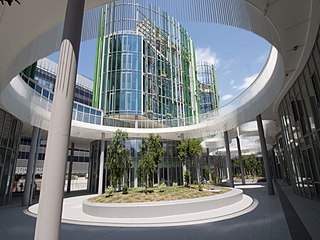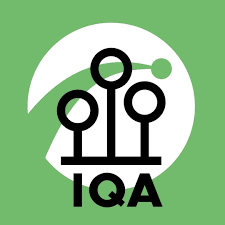
Esperantujo or Esperantio is the community of speakers of the Esperanto language and their culture, as well as the places and institutions where the language is used. The term is used "as if it were a country."

The University of Bonn, officially the Rhenish Friedrich Wilhelm University of Bonn, is a public research university located in Bonn, North Rhine-Westphalia, Germany. It was founded in its present form as the Rhein-Universität on 18 October 1818 by Frederick William III, as the linear successor of the Kurkölnische Akademie Bonn which was founded in 1777. The University of Bonn offers many undergraduate and graduate programs in a range of subjects and has 544 professors. The University of Bonn is a member of the German U15 association of major research-intensive universities in Germany and has the title of "University of Excellence" under the German Universities Excellence Initiative.

The Bregenzerwald is one of the main regions in the state of Vorarlberg (Austria). It overlaps, but is not coterminous with, the Bregenz Forest Mountains, which belong to a range of the Northern Limestone Alps, specifically the northern flysch zone. It is the drainage basin of the Bregenzer Ach river.

Shirin Ebadi is an Iranian Nobel laureate, lawyer, writer, teacher and a former judge and founder of the Defenders of Human Rights Center in Iran. In 2003, Ebadi was awarded the Nobel Peace Prize for her pioneering efforts for democracy and women's, children's, and refugee rights. She was the first Muslim woman and the first Iranian to receive the award.

Merano or (German) Meran is a comune (municipality) in South Tyrol, Northern Italy. Generally best known for its spa resorts, it is located within a basin, surrounded by mountains standing up to 3,335 metres above sea level, at the entrance to the Passeier Valley and the Vinschgau.
The Global Policy Forum (GPF) is an international non-governmental organization founded in December 1993 and based in New York and Bonn .[1] The aim of the Global Policy Forum is to critically accompany and analyze developments in the United Nations and on the topic of global governance. Thereby a bridge between the international and the local level is to be built. GPF seeks to strengthen intergovernmental organizations and promote multilateralism based on solidarity, international law and the United Nations Charter. The Global Policy Forum also has consultative status on the United Nations Economic and Social Council. Jens Martens has been the GPF's executive director since 2014 and director of GPF Europe since its foundation in 2004.[2]

Roma Tre University is an Italian public research university in Rome, Italy, with its main campus in the Ostiense quarter.
The International Cooperative Alliance (ICA) is a non-governmental cooperative organization founded in 1895 to unite, represent and serve cooperatives worldwide. The ICA is the custodian of the internationally recognised definition, values and principles of a cooperative in the ICA Statement on the Cooperative Identity. The ICA represents 315 co-operative federation and organisations in 107 countries.
The International Political Science Association (IPSA), founded under the auspices of UNESCO in 1949, is an international scholarly association. IPSA is devoted to the advancement of political science in all parts of the world. During its history it has helped build bridges between East and West, North and South, and has promoted collaboration between scholars in both established and emerging democracies. Its aim is to create a global political science community in which all can participate, most recently it has been extending its reach in Eastern Europe and Latin America. IPSA has consultative status with the Economic and Social Council of the United Nations (ECOSOC) and it is a member of the International Science Council, which brings together over 230 science organizations across the world and actively cooperates with partners from the United Nations system, such as the United Nations Environment Programme (UNEP), the World Health Organization (WHO), and the United Nations Development Programme (UNDP).
The Deutsche Gesellschaft für Internationale Zusammenarbeit (GIZ) GmbH, often simply shortened to GIZ, is the main German development agency. It is headquartered in Bonn and Eschborn and provides services in the field of international development cooperation and international education work. The organization's self-declared goal is to deliver effective solutions that offer people better prospects and sustainably improve their living conditions.
The International Panorama Council (IPC) is a nongovernmental, not-for-profit organization, subject to Swiss law. It is a global network involving museum directors, managers, artists, restorers and historians who deal with the historical or the contemporary art and media forms of the panorama. The organization comprises members from all over the world who are either representatives of museums and research institutes or private researchers and enthusiasts. The organization was founded in 1992 as the European Panorama Conference in Szeged, Hungary, and renamed in 1998 in Altoetting, Germany, at the International Panorama Conference. Since 2003 the organization is called International Panorama Council. IPC has been a Membership Association since 2010. It is governed by a member-elected Executive Board whose Secretary-general acts as the operational center for the Board’s members.

Torild Skard is a Norwegian psychologist, politician for the Socialist Left Party, a former Deputy Permanent Secretary at the Ministry of Foreign Affairs and a former Chairman of UNICEF.

The Bonn Women's Museum is a women's museum in Bonn, Germany. It was founded in 1981 by Marianne Pitzen and an interdisciplinary group of working women, and claims to be the first museum of its kind in the world. It hosts temporary exhibitions and accompanying events, and is run by the society "Women's Museum – Art, Culture, Research".

Hittisau Women's Museum is a museum in Hittisau, Austria, devoted to women. It was founded in 2000 and is the only museum of its kind in the country.
The International Alliance for Women in Music (IAWM) is an international membership organization of women and men dedicated to fostering and encouraging the activities of women in music, particularly in the areas of musical activity, such as composing, performing, and research, in which gender discrimination is a historic and ongoing concern. In the U.S. the organization operates as a 501(c)3 non-profit. The IAWM engages in efforts to increase the programming of music by female composers, to combat discrimination against female musicians, including as symphony orchestra members, and to include accounts of the contributions of women musicians in university music curricula and textbooks.

The International Quadball Association (IQA), previously known as the International Quidditch Association, is the governing body for the sport of quidditch. It was founded as the Intercollegiate Quidditch Association in 2009 following the very first intercollegiate quidditch match. In 2010, the IQA added the "international" term to its name, and 2016 saw its induction as an international sports federation with its creation of the Congress. It now comprises more than ten national associations governing quidditch in their respective nations.

Franz Tappeiner, Edler von Tappein was an Austrian physician and anthropologist. He was the father of pharmacologist Hermann von Tappeiner.

The Women's Museum Merano is located in a former convent of the Poor Clares in the centre of Meran (Italy). It is administrated by an association and is also the registration office of the International Association of Women's Museums (IAWM).

Susanna Gyulamiryan, Armenian curator, art critic and feminist scholar. She is the appointed curator of the Pavilion of the Republic of Armenia at 58th International Art Exhibition, La Biennale di Venezia (2019). Gyulamiryan is co-founder and the president of the non-governmental organization “Art and Cultural Studies Laboratory” (ACSL), and artistic director of the “Art Commune” International Artist-in-Residence Program. The “Art Commune” is a general member of the Res Artis worldwide network of artist residencies (resartis.org). Gyulamiryan is a (board) member of AICA-Armenia. She has led courses in Gender Studies and Feminist Art [Theory and Practice] at the Department of Fine Arts, Armenian Open University, and has also carried out MA course in Gender Studies at Yerevan State University, Department of Cultural Studies. She worked as a contributing editor and leader of the monthly columns “The Name of Art” and “Art Situations” at “CinemArt” –the journal on cinematography and contemporary art. The circle of Gyulamiryan's professional interests and studies embraced feminist art, participatory /community art and art of social and political engagement in conjunction with civil and political activism.














